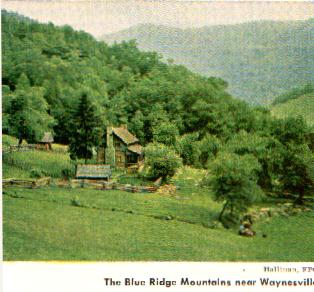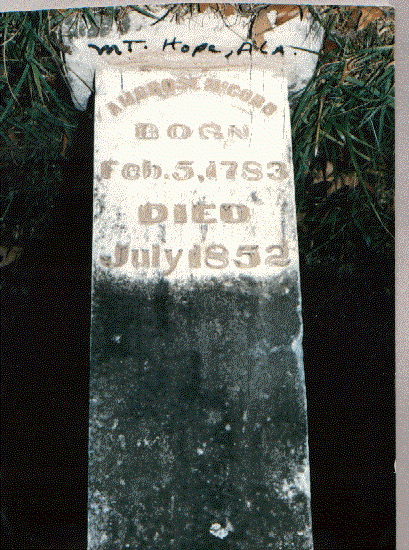
IX. NORTH CAROLINA MCCORDS IN THE REVOLUTION

MT. MITCHELL ON BLUE RIDGE PARKWAY, NORTH CAROLINA
David McCord, son of William McCord of Ft. McCord, was one of the McCords from North Carolina who fought on Washington's side. He saw service in Mecklenburg County, North Carolina in 1781 in an engagement with the British under Cornwallis when Virginia's Brigadier General Daniel Morgan after his famous victory at Cowpens, SC, came through North Carolina at Mecklenburg.
David McCord was married to Ann Shipley, the sister of Abraham Lincoln's grandmother, Mary Shipley.
After the Revolution David and Ann Shipley McCord were among the early pioneers in Kentucky. While enroute there, David and his party were attacked by the Indians and one of the men was shot in the arm and fell from his horse from the shot. The party recovered and went on to Boonesborough.
Other McCords saw service in the American Revolution from North Carolina. They included David and James McCord, sons of David McCord of Derry Pennsylvania, who served in the North Carolina militia in Washington County North Carolina (now Tennessee) with the famous Colonel John Sevier, one of the heroes of the Kings Mountain South Carolina victory and first Governor of Tennessee.
Additional McCords were in North Carolina during the American Revolution, in Mecklenburg and Lincoln Counties,where the head of the Militia was Colonel Thomas Polk, grandfather of James Polk who was later U.S.President.
Thomas Polk's name is on the deeds and titles as a witness of some of the McCord's land transfers in Mecklenburg and Lincoln Counties in the 1780s.' It may be assumed that some of the McCords at that time were in Colonel Polk's militia companies.
It should be noted that the militia companies were called out at a moment's notice in North Carolina and elsewhere during the American Revolution to fight the British and their Indian allies. In a large number of instances, records were not kept by these companies of its members called out. Their task was to defeat the British and their allies, not to keep records. Thus, there may be a very large number of militia members who served in these battles whose names have never appeared in records.

Watercolor of The Battle of "Guilford Courthouse, 15 March 1781" by Charles Barron Jr.
(courtesy of Army Art Collection)
There were several major battles in North Carolina during the Revolution, including Guilford Courthouse where frontier Scotch-Irish militiamen served.
The 1781 'Hornet's Nest' Battle near Charlotte, N.C.
Another battle in North Carolina was one called "Hornet's Nest" in which North Carolina frontier patriots including Edward Shipley, and George Shipley who was married to Elizabeth McCord, participated.
In that battle, outnumbered North Carolina militiamen turned out and by surprise ambushed a much larger force of 450 British infantry and 60 cavalry along a road 7 miles from Charlotte, North Carolina.
It was said of that battle in which the militia losses were few and the British routed that "there was a rebel behind every bush,"according to the British.
Edward and George Shipley were brothers of Abraham Lincoln's grandmother, Mary Shipley. David McCord was married to another one of Edward, George and Mary Shipley's sisters, Anne Shipley.
McCord Clan Society member Barnett Ellis' ancestor George Shipley, who was married to Elizabeth McCord, fought in The 'Hornet's Nest' battle.

Signature of George Shipley on marriage bond of 5 May 1783 to marry Elizabeth McCord in Mecklenburg County, North Carolina
It is said of David McCord who married Anne Shipley, the sister of Abraham Lincoln's grandmother, that the morning David's son (also named David) was born he was fighting the British nearby and the sounds of the guns firing were so loud they could be heard from his home at the time.
David McCord saw action as British troops were crossing a North Carolina river near David's home.
"David was a Revolutionary War soldier. The morning his son, David, was born, he served in a battle 2 miles from his home, close enough for his wife to hear the booming of the guns."
Perhaps this was also at the same battle of the 'Hornet's Nest.'
All McCords in North Carolina during the American Revolutionary years 1776-83, and who were between the ages of 16 and 50 and were not disabled, can be presumed to have been enrolled in the North Carolina militia. North Carolina had a law similar to that of Virginia automatically enrolling all males, not disabled, and between the ages 16-50, in its state militia.(from the book North Carolina)
The Mecklenburg Declaration of Independence was signed in Charlotte, North Carolina by members of the militia forces assembled in Mecklenberg County under Colonel Thomas Polk in 1775, grandfather of President James Polk.
This declaration was made by them a full year before the American Declaration of Independence was formulated and signed in Philadelphia.

A HOME OF THE MCCORDS IN THE 1770'S-1780'S IN MECKLENBURG AND ADJOINING LINCOLN COUNTIES, NORTH CAROLINA MAY HAVE BEEN LITTLE DIFFERENT THAN THE ONE SHOWN ABOVE
The McCord families in North Carolina in the 1760's and 1770's included (1) John McCord, the brother of William McCord who built Ft. McCord, Pennsylvania in 1756; (2) the four sons of William McCord who built the fort: John (known as John of Bedford), David, James, and Robert; (3) John McCord, the son of David McCord of Derry (Hershey) Pennsylvania; (4) James McCord Sr and James McCord Jr of a McCord family coming from Virginia; (5) and married daughters of some of these families.
John McCord, brother of William McCord of Fort McCord brought three orphans sons of William McCord of the Fort to Mecklenburg and Lincoln Counties, North Carolina in the 1760's where they shortly thereafter bought land.


General Andrew Jackson ("Old Hickory") of North and South Carolina, and later Tennessee.
The sketch at the lower right is of Andrew Jackson as a 13-year old boy under attack by a British officer in Mecklenberg County, NC in 1780.
As a teenager, Jackson was imprisoned briefly in the Mecklenberg County Courthouse in the 1780's by the British for insulting British officers fighting the American forces there during the American Revolution.
Some McCords intermarried in Mississippi with the McCamish or McAmis family, close friends and relatives of the later-President Andrew Jackson's family who grew up in the Waxhaws of South Carolina just over the state line from Mecklenberg County, North Carolina.
Andrew Jackson was born just a few miles into South Carolina at Waxhaw, just south of Mecklenberg County, North Carolina. His mother was close to relatives such as the McAmis (McCamish, McCamis) family and the Crawford family who lived just inside the North Carolina line a few miles away and attended the same church as McCord family members who lived there.
Jackson's father had moved to North Carolina from the Condogwinet River area north of Ft. McCord in Pennsylvania.
General Andrew Jackson was Southern Army Commander in the War of 1812 and was a close friend of Sam Houston who fought with him in Alabama in that war.
Houston was an officer from Franklin County, Tennessee and Ambrose and James McCord Jr and a number of other McCords fought in that war from there.
Ambrose, grandson of David McCord of Derry, Pennsylvania moved from Franklin County, Tennessee to Mt. Hope, Lawrence County, Alabama in the 1830's and died there in 1852. His gravestone also bears a War of 1812 veteran's plaque.


HEADSTONE FOR AMBROSE MCCORD, BORN 1783 IN WASHINGTON COUNTY, TENNESSEE, GRANDSON OF DAVID MCCORD OF DERRY, PENNSYLVANIA. AT CEMETERY AT ROCK SPRINGS PRESBYTERIAN CHURCH, MOUNT HOPE, ALABAMA FORMED 1817
More is written elsewhere about Clarence W. McCord, son of James McCord Jr who contributed to the 1882 biography of General Sam Houston of Texas.
Clarence W. McCord's brother-in-law William D. Miller, was the personal secretary and emissary of President Sam Houston of Texas and met with former President Andrew Jackson in 1844 in Tennessee and obtained his political support with his friends in the U.S. Congress which brought Texas into the Union.
In 1815 during the War of 1812, General Andrew Jackson became a hero against the British in an overwhelming victory at The Battle of New Orleans after President James Madison had failed in protecting Washington D.C. from destruction by the British in the War of 1812.
The British burned the White House thereby destroying the Presidency of James Madison who New Englanders were then ready to impeach for letting the nation's defenses fall to such a low state the nation could not even defend its own capitol and White House from destruction. Madison had been preceded by Thomas Jefferson as President who likewise had let the nation's defenses fall into a state of disrepair.
Jackson's brilliant victory at New Orleans led him into the Presidency and a vibrant new air of confidence came to the nation as a result of his leadership. He was a man of the people.